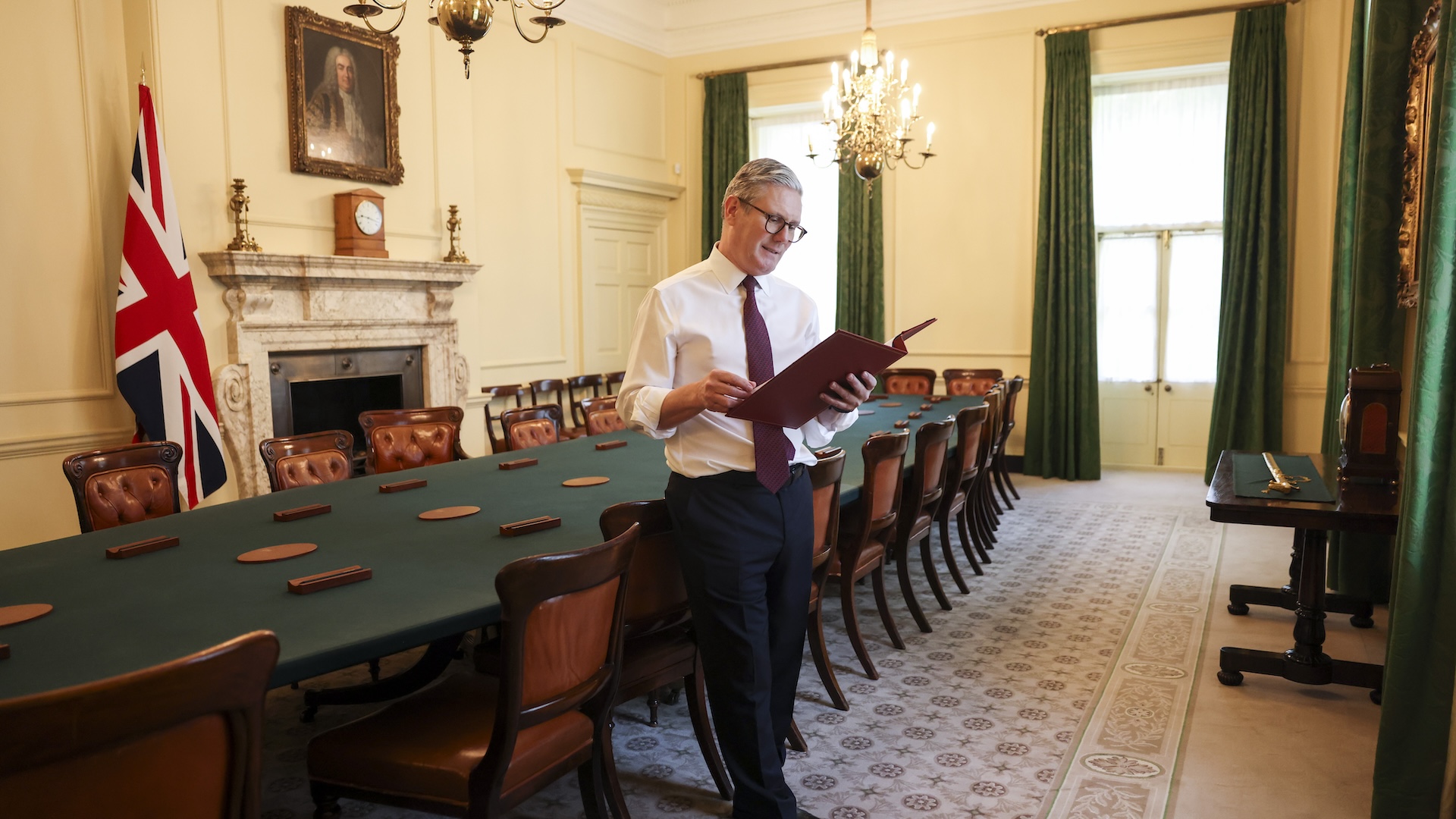“This isn’t party management — it’s over the top diktat. The whip should be reinstated immediately.
Dave Ward, CWU General Secretary
By Bernie Torre, The Morning Star
Keir Starmer has been condemned by union leaders for suspending seven Labour MPs for voting to scrap the two-child benefit cap, as independents including Jeremy Corbyn vowed to work with them to offer a “real alternative.”
Leaders of fire, education, civil service, bakeries and mail unions hit out at the Prime Minister’s “disgraceful” and “completely wrong” decision as they joined thousands backing a grassroots petition calling for their reinstatement.
Former shadow chancellor John McDonnell, ex-shadow business secretary Rebecca Long Bailey, Apsana Begum, Richard Burgon, Ian Byrne, Zarah Sultana and Imran Hussain were kicked out of the Parliamentary Labour Party for six months for backing an SNP amendment calling for the cap to be scrapped on Tuesday night.
Ms Sultana, MP for Coventry South, suggested she was the victim of a “macho virility test” today.
“This isn’t a game … this is about people’s lives,” she added.
“I slept well knowing that I took a stand against child poverty that is affecting 4.3 million people in this country and it is the right thing to do and I am glad I did it.”
MP for Poplar and Limehouse Ms Begum said: “Labour’s own 11 affiliated unions support the scrapping of the two-child benefit cap; there’s popular support among the Labour Party membership to see the cap lifted.”
Ms Begum, who has been a victim of domestic abuse, added that it was “unacceptable” that Labour whips had offered her support on bills in that area if she voted with the government.
“It’s very heartbreaking to see such a draconian stand being taken by my party on the vote today which was not against the Labour Party plan or programme,” she said.
John McDonnell said: “The two-child cap on benefits was one of the cruellest policies of the Osborne era. The king’s speech amendment “was a plea to include this basic reform in the programme.”
He said Labour’s budget preparation “was under way quickly after the election; it is becoming increasingly apparent that the chancellor has left herself sufficient flexibility on estimates of growth and additional taxation measures to accommodate the measure.“
Former Labour leader Mr Corbyn and four other left independents signed a letter in solidarity to the seven MPs, saying the punishment was “beyond disgraceful” and “displays a shameful absence of moral leadership.”
Leading the calls for the MPs’ reinstatement, TUC president and Fire Brigades Union general secretary Matt Wrack said: “The UK is a rich country with ample resources for everyone to live a decent life.
“The seven MPs who voted to scrap the cap spoke for millions of trade union members and many Labour Party members. Keir Starmer must restore the whip to them immediately.”
RMT general secretary Mick Lynch said: “It’s a shame that they haven’t agreed to get rid of the cap and I’m very proud of the MPs who have rebelled tonight.”
National Education Union general secretary Daniel Kebede said: “There is no more important issue in this country than that of child poverty.
“What is deeply disappointing is that issue is now being reduced to some ‘Labour factional war.’ Every person I know who has actually worked with children thinks the two-child benefit cap should go at the earliest opportunity.”
Communication Workers Union general secretary Dave Ward said: “To see Labour suspending MPs who are fighting to end child poverty is completely wrong.
“This isn’t party management — it’s over the top diktat. The whip should be reinstated immediately.”
Public and Commercial Services general secretary Fran Heathcote said: “Labour MPs should not be disciplined for fighting child poverty. Sign the petition to restore the whip.”
BFAWU general secretary Sarah Woolley added: “It’s disgraceful less than three weeks after telling the world ‘country before party’ that seven MPs have been suspended for taking that stance, we stand in solidarity with Apsana, Richard, Becky, John, Zarah and Ian and demand they have the whip reinstated.”
Labour national executive committee member Gemma Bolton added: “Keir Starmer and company still seem more obsessed with bashing the left than changing the country.”
The petition was initiated by the Labour Assembly Against Austerity and Arise — A Festival of Left Ideas.
Their spokesman Matt Willgress said: “These seven MPs were right to support a measure that would lift 300,000 children out of poverty — and would be a great start to undoing the social emergency caused by 14 years of failed Tory austerity.”
MPs voted 363 to 103 to reject the amendment after the Morning Star went to press on Tuesday night.
No Scottish Labour MPs joined the rebels despite their leader Anas Sarwar lobbying Sir Keir for the Tory-era cap, which restricts child welfare payments to the first two children born to most families, to be axed.
Today Sir Keir vowed to tackle child poverty “with the same vigour” as the last Labour government when challenged over his refusal to immediately axe the two-child benefit cap at his first Prime Minister’s Questions since entering No 10.
Defying the government over the King’s Speech “is a serious matter,” Downing Street said.
- The petition can be signed here. Make sure to add your name in support of John McDonnell, Rebecca Long Bailey, Zarah Sultana, Richard Burgon, Apsana Begum, Ian Byrne and Imran Hussain.
- If you support Labour Outlook’s work amplifying the voices of left movements and struggles here and internationally, please consider becoming a supporter on Patreon.
- This article was originally published by The Morning Star on July 24th, 2024
'Shameful stuff': Labour suspends seven rebel MPs who voted to end two-child benefit cap
There were seven Labour MPs who had the whip removed after voting for an SNP motion to end the two-child limit on benefits. They say they were "taking a stand against child poverty"THE BIG ISSUE

Ending the two-child benefit cap was not included in the King's Speech. Image: Simon Dawson/ No 10 Downing Street/ Flickr
Labour MPs who voted to scrap the two-child benefit cap have said they were “putting country before party” by “taking a stand against child poverty”.
There were seven Labour MPs who rebelled against their party and voted for an SNP motion calling for an end to the two-child limit on benefits on Tuesday night (23 July).
They were John McDonnell, Zarah Sultana, Richard Burgon, Ian Byrne, Apsana Begum, Imran Hussain and Rebecca Long-Bailey.
The two-child limit means that families claiming benefits such as universal credit or child tax credit who have a third child or subsequent children born after April 2017 are denied extra financial support. It works out at a loss of up to £3,500 per year in comparison to families whose kids were born sooner.
Charities estimate that scrapping the two-child benefit cap would lift 300,000 children out of poverty, and 700,000 children would be in less deep poverty.
In recent days, the Labour government has said it would “consider” scrapping the two-child limit on benefits and has set up a ministerial taskforce to look at ways to reduce child poverty in the UK.
Yet the government has so far refused to commit to ending the policy. Education secretary Bridget Phillipson, who is co-leader of the child poverty taskforce, said the government will “look at all levers in terms of how we can lift children out of poverty”, including the two-child limit.
Zarah Sultana, who had the Labour whip removed last night, said on Good Morning Britain: “In my constituency of Coventry South, 10,000 children live in poverty. That is one in three children.
“When I’m talking to parents, and teachers, and volunteering at the food bank, I am hearing these stories of kids going to bed hungry at night. They are going to bed on an empty stomach. They are returning to cold homes. They are missing out on experiences that every child should enjoy.
“There are all of these impacts on children beyond the immediate impacts. This is on their health, their wellbeing and even their life expectancy. So those are all the stories I need to know when I’m voting in this particular way. I got elected and I’m in the Labour Party. I joined when I was 17 years old because I care about equality and social justice.”
Almost half (45%) of families say they struggle to pay their rent or mortgage because of the two-child limit, according to the Child Poverty Action Group. A similar proportion (46%) struggle to manage childcare costs.
Sultana added: “For me, taking a stand against child poverty, which is one of the biggest scourges in the country which affects 4.3 million children, is something that I’m very proud to have stood my ground on.
“I think the two-child benefit cap, alongside 11 Labour-affiliated unions, the TUC which represents six million workers, Gordon Brown, the archbishop of Canterbury, even Keir Starmer in his 2020 leadership pitch, we all think that it should be scrapped and that’s what voted on yesterday.”
More than half (52%) of all households impacted by this policy are single parents, but within the general population just 16% of households are headed by a single parent. The majority of lone parents are women.
Imran Hussain, the MP for Bradford East, who had the Labour whip removed, said on social media that he is “disappointed to have had the whip suspended over this vote”.
“But it was important for me to stand up for my constituents who are amongst the worst affected by a policy that every organisation fighting child poverty has urged the government to scrap,” he added.
“The two-child limit is one of the biggest factors driving the soaring child poverty rate that sees almost half of all children in Bradford East living in homes that are unable to make ends meet.”
Around 440,000 families across the UK are impacted by the two-child benefit cap, official figures show. That is 1.6 million children denied support.
Ian Byrne, who is MP for Liverpool West Derby, referenced End Child Poverty Coalition figures which show that more than 43% of children in his constituency are living in poverty.
He posted: “Experts say that the best way to immediately impact this is to scrap the two-child cap. This is why this evening I voted for the Kings Speech amendment to scrap the cap. #RightToFood.”
Taj Ali, the co-editor of Tribune Magazine, said: “Ian Byrne is one of the hardest-working people I know. He’s been campaigning against child poverty in Liverpool and across the country for many many years. He’s one of seven Labour MPs to lose the whip tonight for voting against the two-child limit. Shameful stuff.”
Shockingly, 3,100 women had to declare that they had been the victim of rape last year in order to gain an exemption to this policy.
Richard Burgon, the Labour MP for Leeds East, said: “As an MP in an area where 45% of children live in poverty, one of the highest in the country, I simply believe that this strategy must include scrapping this measure. That’s something that many struggling families in my area have raised with me.
“Every child poverty expert says this is a key way of lifting children out of poverty and I encourage the new government to come forward with a plan on this, alongside its other initiatives, as so many other figures across the Labour Party and our wider trade union movement have called for.”
Unions which are affiliated with the Labour Party have called on the government to scrap the two-child benefit cap. Mick Whelan, the general secretary of Britain’s trade union for train drivers, Aslef said he gives his “full support to those who actually have a social conscience to end the two child cap”.
The general secretary of the National Education Union (NEU), Daniel Kebede, agreed. He said: “I stand with all those MPs who voted to scrap the two-child benefit cap.”
Particularly, he stands with the Labour MPs who rebelled against their own party, he said. “Child poverty is a political choice not an economic one – and scrapping the cap would be the single most effective policy to alleviate such a crushing burden on children,” Kebede added.
Yet Emma Lewell-Buck, Labour MP for South Shields, who did not vote for the two-child limit to be scrapped, said: “None of the votes taking place tonight would have resulted in scrapped the cap. Continued efforts from those on the Labour government benches will.
“There will be an Autumn Budget soon and I know myself and other colleagues will be working constructively with the government to make scrapping the cap part of it.”
Torsten Bell, the Labour MP for Swansea West who was previously the chief executive of the Resolution Foundation, said: “People are rightly impatient to see progress, but the government has to be allowed to develop and bring forward that crucial strategy. Reducing child poverty means bringing together not just social security policy, but labour market, housing and many other important areas.”
Bell has previously called on the government to drop the two-child limit through his work at the Resolution Foundation, but he voted with the government last night.
“My case for optimism is that history tells us Labour governments do focus on child poverty and do deliver real change. I worked with Gordon Brown as child tax credits were rolled out and transformed lives – over half a million children were taken out of poverty.
“Plus you can already see how policies of this Labour government will make a difference. Too many low earners not getting the hours work they want is a big feature of low income Britain today, and banning exploitative zero hour contracts will make their incomes more secure.
“As an aside, you don’t often see big changes to social security outside of fiscal events because decisions have to be made in the round (underpinned by fiscal forecasts). I spent long enough as an HMT civil servant to know the alternative is chaos. We’ve had quite enough of that.”









